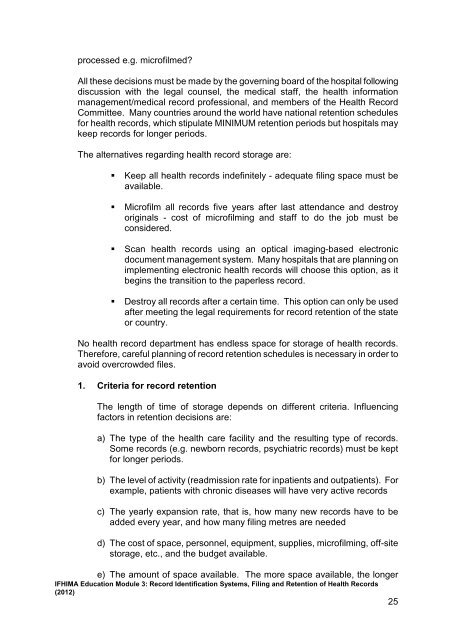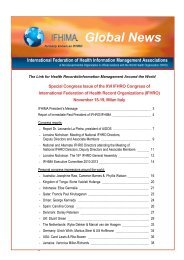Learning Packages for Medical Record Practice - ifhima
Learning Packages for Medical Record Practice - ifhima
Learning Packages for Medical Record Practice - ifhima
Create successful ePaper yourself
Turn your PDF publications into a flip-book with our unique Google optimized e-Paper software.
processed e.g. microfilmed?<br />
All these decisions must be made by the governing board of the hospital following<br />
discussion with the legal counsel, the medical staff, the health in<strong>for</strong>mation<br />
management/medical record professional, and members of the Health <strong>Record</strong><br />
Committee. Many countries around the world have national retention schedules<br />
<strong>for</strong> health records, which stipulate MINIMUM retention periods but hospitals may<br />
keep records <strong>for</strong> longer periods.<br />
The alternatives regarding health record storage are:<br />
� Keep all health records indefinitely - adequate filing space must be<br />
available.<br />
� Microfilm all records five years after last attendance and destroy<br />
originals - cost of microfilming and staff to do the job must be<br />
considered.<br />
� Scan health records using an optical imaging-based electronic<br />
document management system. Many hospitals that are planning on<br />
implementing electronic health records will choose this option, as it<br />
begins the transition to the paperless record.<br />
� Destroy all records after a certain time. This option can only be used<br />
after meeting the legal requirements <strong>for</strong> record retention of the state<br />
or country.<br />
No health record department has endless space <strong>for</strong> storage of health records.<br />
There<strong>for</strong>e, careful planning of record retention schedules is necessary in order to<br />
avoid overcrowded files.<br />
1. Criteria <strong>for</strong> record retention<br />
The length of time of storage depends on different criteria. Influencing<br />
factors in retention decisions are:<br />
a) The type of the health care facility and the resulting type of records.<br />
Some records (e.g. newborn records, psychiatric records) must be kept<br />
<strong>for</strong> longer periods.<br />
b) The level of activity (readmission rate <strong>for</strong> inpatients and outpatients). For<br />
example, patients with chronic diseases will have very active records<br />
c) The yearly expansion rate, that is, how many new records have to be<br />
added every year, and how many filing metres are needed<br />
d) The cost of space, personnel, equipment, supplies, microfilming, off-site<br />
storage, etc., and the budget available.<br />
e) The amount of space available. The more space available, the longer<br />
IFHIMA Education Module 3: <strong>Record</strong> Identification Systems, Filing and Retention of Health <strong>Record</strong>s<br />
(2012)<br />
25













